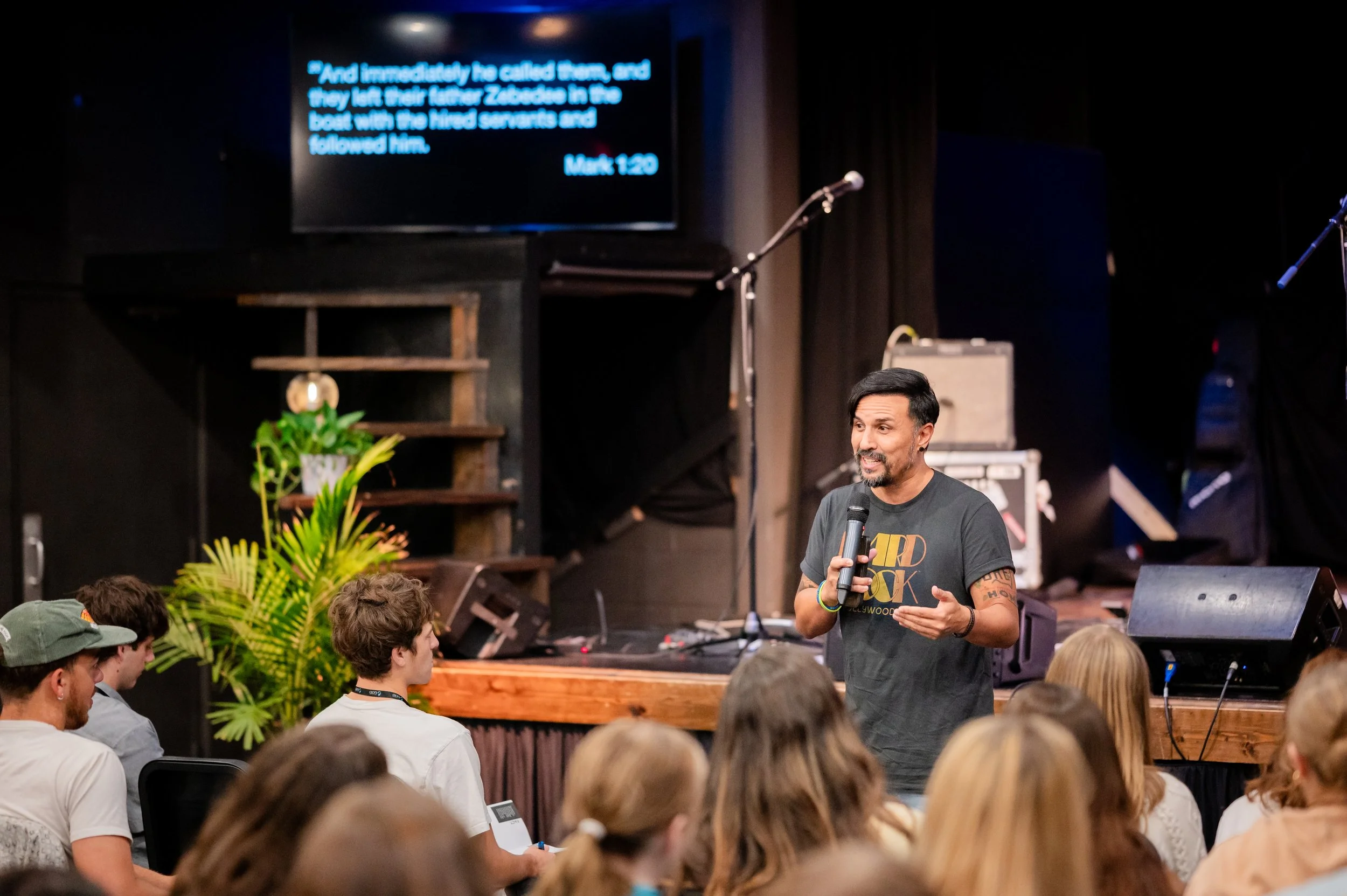First Chapel Recap: Learning the Word, Recognizing the Shepherd’s Voice
The first chapel of a new term carries weight. It marks not just the return of students to campus, but the renewal of the community’s commitment to live under the authority of God’s Word together. President Gregg Garner, Founder and President of The Institute for GOD, opened to John 1 and set the direction for the semester with clarity: if we want to know Jesus, we must know Scripture.
This was not offered as a slogan or sentiment, but as a biblical necessity. John’s prologue begins, “In the beginning was the Word, and the Word was with God, and the Word was God.” In just a few words, John ties his account to the opening of Genesis and makes an uncompromising claim: God makes Himself known through His Word. Later in verse 14, the Word becomes flesh and dwells among us. To know Jesus is to know the Word. To disregard Scripture is to disregard Christ.
Reading John Carefully
Garner urged students to read John with attention to its literary form. Modern readers are accustomed to quotation marks, paragraph breaks, and red-letter editions that attempt to separate Jesus’ words from narration. But the original manuscripts lacked these markers. The Gospel of John moves fluidly between narration and quoted speech, and careless reading can lead to confusion.
Something as simple as assuming Jesus always refers to Himself in the third person misses John’s use of narration to clarify and interpret. In other words, careful reading matters. The goal is not to master trivia, but to avoid confusing the narrator’s theological exposition with Jesus’ own speech.
“He came to His own, and His own did not receive Him.”
One of the most sobering statements in the prologue comes in verses 10–11: “He was in the world, and the world was made through Him, yet the world did not know Him. He came to His own, and His own people did not receive Him.”
This is not about strangers to Scripture. It is about the covenant people of God, shaped by weekly exposure to the Law and the Prophets, failing to recognize the very One they awaited. The warning is clear: if it happened then, it can happen now.
Churches filled with Scripture-reading people can still refuse Christ when He is revealed through the Word. The problem is not access to information but hardness of heart. Garner emphasized that reception of the Word requires humility and repentance. A willingness to let the Word contradict us is what keeps us from falling into the same trap.
Why Scripture can feel strange in today’s church
To help students understand the tension they may feel, Garner gave a brief historical survey. In the 1990s and 2000s, many churches in America began to adopt business strategies, production budgets, and consumer-driven models for growth. Leaders like Bill Hybels at Willow Creek and Rick Warren at Saddleback redefined ministry effectiveness by attendance numbers and practical appeal.
The results were mixed. Attendance grew, but biblical literacy declined. The pulpit shifted from being a place where the Word created necessary friction—where iron sharpened iron—to being a stage where messages had to be “helpful,” “practical,” and “encouraging” to keep seats filled and revenue steady. Sermons that demanded thought, repentance, or discomfort were increasingly set aside.
The unintended consequence is that many Christians are more trained to evaluate whether something is entertaining or encouraging than whether it is biblical. When that becomes the instinct, hearing a genuine exposition of the Word can feel abrasive. Garner’s point was not nostalgia but reality: if you train your appetite on spectacle, exegesis will feel strange. If you train your appetite on Scripture, spectacle will feel thin.
Recognizing the Shepherd’s Voice
From John 1, Garner moved to John 10, where Jesus describes His sheep as those who recognize His voice and refuse to follow a stranger. This is not mystical intuition. It is cultivated discernment. Sheep know the Shepherd’s voice because they hear it consistently. The more time we spend in Scripture, the more obvious counterfeit voices become. The less time we spend in Scripture, the easier it is to be swayed by charisma, opinion, or volume.
This was presented as the central formation goal of the semester: cultivate ears that know the Shepherd’s voice in Scripture. Without that grounding, it is possible to confuse nearly anything persuasive for divine truth. With it, the church becomes resilient against deception.
Fans, “stans,” and disciples
To illustrate, Garner borrowed from popular culture. A “stan,” a term made famous through an Eminem song, refers to a superfan who identifies deeply with an artist but knows nothing of the real person. Such fans memorize lyrics, buy merchandise, and even tattoo themselves with symbols of devotion, but the relationship remains one-sided and imaginary.
Many Christians approach Jesus the same way. They admire Him, repeat His words, and collect inspirational sayings, yet never submit to what Scripture reveals about Him. True discipleship is not fandom. It is a submission. A real relationship with Christ is not admiration of His anthology but obedience to His Word.
Testimony of Resilience
The message became more personal when Garner spoke of his own experience. After a devastating accident in Uganda that required multiple surgeries and left him with lasting damage to his senses, even eating became a trial. Teaching required endurance—sometimes from a wheelchair, sometimes lying down. Yet he continued to serve and instruct, not out of bravado, but conviction.
His conclusion was simple: God does not lead His people around the wilderness; He leads them through it. The lesson was not toughness for its own sake but alignment with the pattern of Scripture. Resilience in the Christian life comes from Spirit-enabled obedience anchored in the Word, not in mood or convenience.
The Parable of the Soils
Garner concluded with the Parable of the Soils as a diagnostic lens. The same seed falls on four soils, but only one bears fruit. Fruitfulness is not a seed problem; it is a soil problem. The condition of the heart determines whether the Word produces anything lasting.
For students, this means that the semester ahead will be shaped not only by what is taught but by how it is received. The challenge is to become good soil: receptive, obedient, and steady.
The reward is not merely information but transformation—confidence in knowing Christ through His Word.
Conclusion
The first chapel of the year did not aim to entertain or inspire in vague terms. It set a serious trajectory: to be a student of the Word, to recognize the Shepherd’s voice, and to resist the temptation to live as a fan rather than a disciple.
If John 1 is true—if the Word was with God, was God, and became flesh—then the semester ahead will not be measured by events or energy but by whether we submit to Scripture as the living Word that reveals Christ. In Garner’s words, “The reward is Jesus. A real relationship with Jesus. That is what we are here for, and that is what we are about.”
Takeaways
To know Jesus is to know Scripture; John 1 makes this unavoidable.
Careful reading guards us from confusing narration and quotation in the Gospel of John.
The modern church often prizes entertainment and practicality; discipleship requires Scripture even when it confronts.
Sheep know the Shepherd’s voice by hearing it consistently in Scripture.
True disciples are not fans or “stans” but people who submit to the Word.
Fruitfulness depends on the condition of the soil—our readiness to receive and obey.
Sources
Willow Creek’s founding and influence on the seeker-sensitive megachurch model: Christianity Today, “Willow Creek’s Place in History” (2000). https://www.christianitytoday.com/2000/11/willow-creeks-place-in-history
Overview of Willow Creek’s development and the Willow Creek Association: Wikipedia, “Willow Creek Community Church.” https://en.wikipedia.org/wiki/Willow_Creek_Community_Church
Saddleback’s early growth and Rick Warren’s “Purpose Driven” philosophy: Christianity Today, “Boomers, the Big Sort, Hybels, Warren, Driscoll” (Podcast transcript, 2021). https://www.christianitytoday.com/podcasts/the-rise-and-fall-of-mars-hill/mars-hill-podcast-boomers-big-sort-hybels-warren-driscoll
Sociological perspective on the megachurch movement: Stephen Hunt, The Growth of the Megachurch, ResearchGate (2023). https://www.researchgate.net/publication/373867948_The_Growth_of_the_Megachurch
Rick Warren on misconceptions about megachurches: Pew Research Center, “Myths of the Modern Megachurch” (2005). https://www.pewresearch.org/religion/2005/05/23/myths-of-the-modern-megachurch





